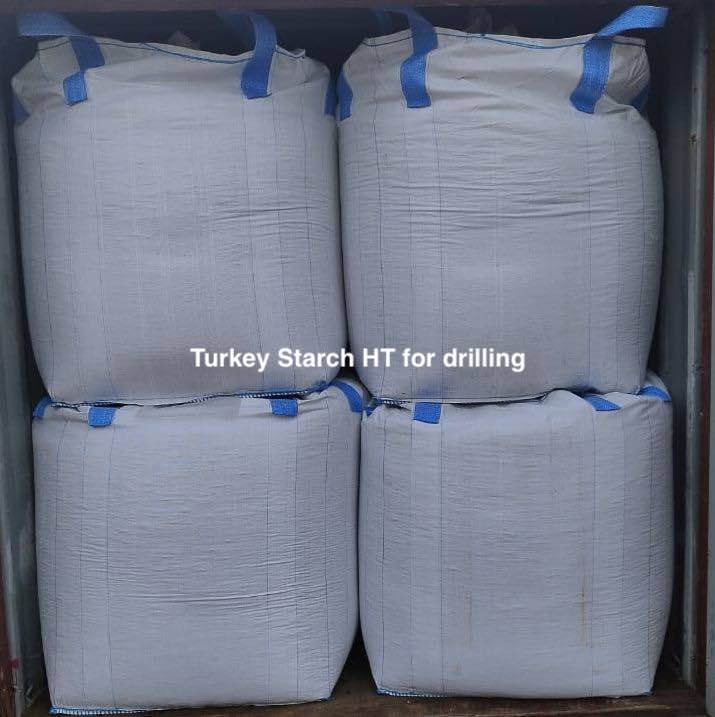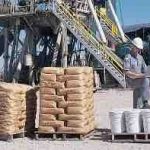
Turkey Starch for drilling mud
- Home
- Turkey Starch for drilling mud

What is Drilling Starch?
Drilling starch is a polysaccharide derivative, typically derived from natural sources such as corn, potato, or tapioca, and modified to enhance its functionality in water-based drilling fluids. It serves as a critical additive for controlling fluid loss, increasing viscosity, and stabilizing borehole walls during drilling operations. Our drilling starch is available in various grades—High Viscosity (HV), Low Viscosity (LV), High Temperature (HT), and Low Temperature (LT)—tailored to meet specific drilling conditions.
Starch, a natural polymer extracted from diverse plant sources like corn, wheat, and potatoes, holds immense significance in the realm of drilling operations within the oil and gas industry. Its unique properties render it an invaluable additive to drilling fluids.
Different types of Turkey Starch
In the industrial landscape, various modified starches, including HT, LT, HV, and LV Turkey starch, serve distinct purposes across different sectors like food, pharmaceuticals, and oil and gas.
Table of Contents
ToggleHV Starch (High Viscosity Starch): Engineered to possess a higher molecular weight and increased viscosity compared to regular starch, HV Turkey starch serves as a versatile thickener, stabilizer, and binder in food and pharmaceutical applications.
HT Starch (High-Temperature Starch): Tailored to endure high temperatures, HT starch finds extensive use in industries such as paper manufacturing, textiles, and oil and gas. It acts as a thickener, binder, and fluid loss control agent in drilling fluids.
LV Starch (Low Viscosity Starch): Modified to exhibit lower viscosity than standard starch, LV Turkey starch serves as a coating agent, binder, and emulsifier in food and pharmaceutical sectors.
LT Starch (Low-Temperature Starch): Designed to withstand low temperatures, LT starch finds applications in paper manufacturing, textiles, and oil and gas industries, functioning as a thickener, binder, and fluid loss control agent in drilling fluids.
The incorporation of starch-based drilling fluids plays a pivotal role in regulating viscosity and controlling fluid loss during operations. By enhancing viscosity, starch facilitates the suspension of cuttings and prevents settling at the well bottom. Moreover, it aids in reducing fluid loss by forming a thin, impermeable filter cake on the wellbore walls.
Modified Starch: Enhancing Performance
Modified starch is chemically or physically altered to improve its resistance to high temperatures, shear stress, and saline environments—common challenges in deep-well and high-pressure, high-temperature (HPHT) drilling. Through processes like acetylation or carboxymethylation, our modified starch overcomes the limitations of conventional starch, such as thermal decomposition and retrogradation, making it an ideal choice for complex drilling operations.
Benefit of using starch in drilling
Fluid Loss Control
Our drilling starch forms a thin, impermeable filter cake on the borehole wall, reducing filtrate invasion into formations and preventing formation damage.
Viscosity Adjustment
Available in HV and LV grades, it allows precise control of mud rheology based on operational needs.
Thermal Stability
HT-modified starch withstands temperatures exceeding 300°F (149°C), ensuring performance in HPHT wells.
Compatibility
Non-ionic and stable in high-salinity brines (e.g., KCl, NaCl, CaCl2), it performs reliably in diverse water-based mud systems.
Environmental Safety
Biodegradable and easily removable with acids or oxidizers, our products align with stringent environmental regulations.
Our Izmir factory employs rigorous quality control, adhering to international standards such as API 13A, ISO 9001, and OCMA, ensuring consistent product performance.
Specifications
Purity: ≥98% (API 13A compliant)
Viscosity: Customizable (HV: >50 cP, LV: <20 cP)
Temperature Resistance: Up to 350°F (177°C) for HT grades
Packaging: 25 kg or 50 kg sacks, customizable for bulk export
Important Parameters in Starch Drilling Analysis and Data Sheet
1. Viscosity: Viscosity plays a crucial role in determining the starch’s ability to suspend cuttings and maintain wellbore stability. Viscosity testing is typically conducted using a viscometer, such as a Brookfield viscometer, with results reported in centipoise (cP).
2. Particle Size: The particle size of starch can significantly impact its performance as a drilling fluid additive. Particle size analysis is commonly done using a laser diffraction particle size analyzer, with results reported in microns.
3. Fluid Loss: Fluid loss is a critical parameter that influences the drilling fluid’s ability to maintain wellbore stability and prevent formation damage. Fluid loss testing is typically carried out using a filter press, with results reported in milliliters.
4. Solubility: Solubility is vital in determining the starch’s ability to dissolve in water and form a stable solution. Solubility testing is usually conducted using a hot plate, with results reported as a percentage.
5. Purity: Purity testing is essential to ensure that the starch is free from impurities or contaminants that could affect its performance. This involves analyzing the starch for heavy metals, ash content, and other impurities.
Data sheet of Turkey starch
This detailed analysis and data sheet provide essential insights into the properties and performance of starch drilling fluids, aiding in their effective utilization in drilling operations.
| Sample | |
| 350 S.S.W, cc | |
| 14 STARCH, gr | |
| 122.8 BARITE, gr | 911 HEMATITE, gr |
| 41 | 70.5 |
| 150 M.W, pcf | |
| 15% by mud volume | |
| FORMATION WATER |
| After Addition of Formation Water | Before Addition of Formation Water | Rheological Properties | |
| AHR | |||
| 59 | |||
| RPM 600 | |||
| 52 | 58±2 | 57 | 65±5 |
| RPM 200 | |||
| 14 | 15±2 | 17 | 18±2 |
| RPM 6 | |||
| 4 | 4±1 | 6 | 5±1 |
| RPM 10 | |||
| 5 | 6±1 | 7 | 7±1 |
| 7 | 7±0.5 | 7 | 7±0.5 |
| 1 | 1 | 0.3 | 1 |
Why customers buying starch from Basekim?
Cost-Effective Pricing
Sourcing raw materials locally in Turkey and optimizing production in Izmir allow us to offer competitive prices without compromising quality.
Export Expertise
From Jebel Ali Port in Dubai, we ship to major drilling markets, including Saudi Arabia, Qatar, Oman, and beyond, with efficient customs clearance and logistics support.
Customization
Tailored starch formulations to meet specific project requirements, backed by technical consultation from our Ankara team.
Reliable Supply Chain
Dual-country presence ensures uninterrupted supply, even during peak demand periods.
After-Sales Support
Dedicated teams in Istanbul and Dubai provide ongoing assistance, from product integration to troubleshooting.
FAQs
Is drilling starch environmentally friendly?
Yes, drilling starch is derived from natural sources and is biodegradable, posing minimal harm to the environment.
What are the primary applications of drilling starch?
Drilling starch is widely used in maintaining viscosity and controlling fluid loss in drilling operations across various industries.
How does drilling starch contribute to cost-effectiveness in drilling operations?
Starch serves as a cost-efficient alternative to other drilling fluid additives, reducing overall operational costs.
Are there any health risks associated with handling drilling starch?
No, drilling starch is non-toxic and does not pose health risks to personnel.
Why is thorough testing of starch-based drilling fluids important?
Testing ensures the optimal performance and effectiveness of starch-based drilling fluids under different conditions, enhancing overall operational efficiency.
Contact Info
Turkey office:No.6 of Fahrettin Pasa Sokak , Galip Erdem steet, Ilkbahar Mah. Turan Gunes Ave. Çankaya Ankara
Phone: 00903125147055
Dubai office: 3509 of the Burligton tower, business bay, dubai-uae
Phone:0097142369830
E-Mail: [email protected]

